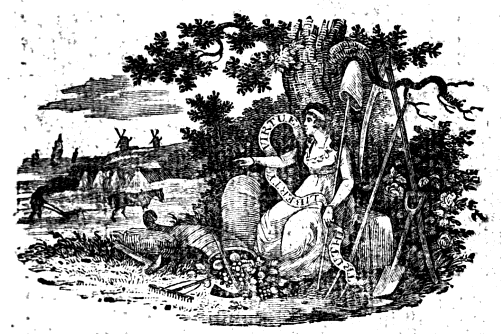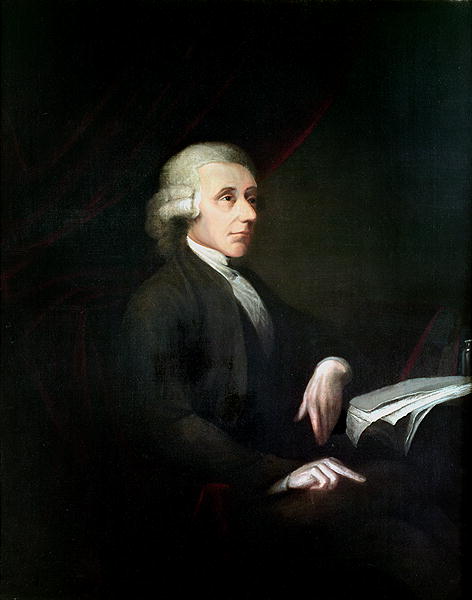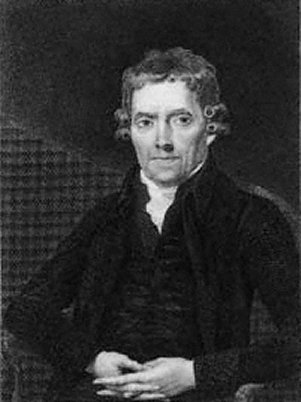|
The Oeconomist, Or, Englishman's Magazine
''The Oeconomist'', full title ''The Oeconomist, Or, Englishman's Magazine'', was an English monthly periodical at the end of the 18th century. It was published in Newcastle upon Tyne, and was edited by Thomas Bigge, in partnership with James Losh. Contributors and content The contributors to ''The Oeconomist'' included some of those associated with the "Friends of Peace", an anti-war network, such as Vicesimus Knox. Theophilus Lindsey offered to help Bigge by soliciting contributions, but came away empty-handed when he approached William Belsham and Ann Jebb. Graham counts Bigge an ally of Christopher Wyvill. Besides Losh, the contributors included William Turner and Thomas Beddoes. An article appeared signed "V.F.", praising Count Rumford's workhouse in Munich, and describing a Rumford soup kitchen in Newcastle. "V.F." was a pseudonym used by Turner. Poetry by William Cowper was featured. ''The Oeconomist'' took a moralising as well as a political tone. Scrivener identifies it ... [...More Info...] [...Related Items...] OR: [Wikipedia] [Google] [Baidu] |
Newcastle Upon Tyne
Newcastle upon Tyne ( RP: , ), or simply Newcastle, is a city and metropolitan borough in Tyne and Wear, England. The city is located on the River Tyne's northern bank and forms the largest part of the Tyneside built-up area. Newcastle is also the most populous city of North East England. Newcastle developed around a Roman settlement called Pons Aelius and the settlement later took the name of a castle built in 1080 by William the Conqueror's eldest son, Robert Curthose. Historically, the city’s economy was dependent on its port and in particular, its status as one of the world's largest ship building and repair centres. Today, the city's economy is diverse with major economic output in science, finance, retail, education, tourism, and nightlife. Newcastle is one of the UK Core Cities, as well as part of the Eurocities network. Famous landmarks in Newcastle include the Tyne Bridge; the Swing Bridge; Newcastle Castle; St Thomas’ Church; Grainger Town includin ... [...More Info...] [...Related Items...] OR: [Wikipedia] [Google] [Baidu] |
Joseph Johnson (publisher)
Joseph Johnson (15 November 1738 – 20 December 1809) was an influential 18th-century London bookseller and publisher. His publications covered a wide variety of genres and a broad spectrum of opinions on important issues. Johnson is best known for publishing the works of radical thinkers such as Mary Wollstonecraft, William Godwin, Thomas Malthus, Erasmus Darwin and Joel Barlow, feminist economist Priscilla Wakefield, as well as religious Dissenters such as Joseph Priestley, Anna Laetitia Barbauld, Gilbert Wakefield, and George Walker. In the 1760s, Johnson established his publishing business, which focused primarily on religious works. He also became friends with Priestley and the artist Henry Fuseli – two relationships that lasted his entire life and brought him much business. In the 1770s and 1780s, Johnson expanded his business, publishing important works in medicine and children's literature as well as the popular poetry of William Cowper and Erasmus Darwin. Through ... [...More Info...] [...Related Items...] OR: [Wikipedia] [Google] [Baidu] |
1799 Disestablishments In Great Britain
Events January–June * January 9 – British Prime Minister William Pitt the Younger introduces an income tax of two shillings to the pound, to raise funds for Great Britain's war effort in the French Revolutionary Wars. * January 17 – Maltese patriot Dun Mikiel Xerri, along with a number of other patriots, is executed. * January 21 – The Parthenopean Republic is established in Naples by French General Jean Étienne Championnet; King Ferdinand I of the Two Sicilies flees. * February 9 – Quasi-War: In the single-ship action of USS ''Constellation'' vs ''L'Insurgente'' in the Caribbean, the American ship is the victor. * February 28 – French Revolutionary Wars: Action of 28 February 1799 – British Royal Navy frigate HMS ''Sybille'' defeats the French frigate ''Forte'', off the mouth of the Hooghly River in the Bay of Bengal, but both captains are killed. * March 1 – Federalist James Ross becomes President pro tempore of the United States Senate. * March ... [...More Info...] [...Related Items...] OR: [Wikipedia] [Google] [Baidu] |
1798 Establishments In Great Britain
Events January–June * January – Eli Whitney contracts with the U.S. federal government for 10,000 muskets, which he produces with interchangeable parts. * January 4 – Constantine Hangerli enters Bucharest, as Prince of Wallachia. * January 22 – A coup d'état is staged in the Netherlands ( Batavian Republic). Unitarian Democrat Pieter Vreede ends the power of the parliament (with a conservative-moderate majority). * February 10 – The Pope is taken captive, and the Papacy is removed from power, by French General Louis-Alexandre Berthier. * February 15 – U.S. Representative Roger Griswold (Fed-CT) beats Congressman Matthew Lyon (Dem-Rep-VT) with a cane after the House declines to censure Lyon earlier spitting in Griswold's face; the House declines to discipline either man.''Harper's Encyclopaedia of United States History from 458 A. D. to 1909'', ed. by Benson John Lossing and, Woodrow Wilson (Harper & Brothers, 1910) p171 * March – ... [...More Info...] [...Related Items...] OR: [Wikipedia] [Google] [Baidu] |
Cambridge Intelligencer
The ''Cambridge Intelligencer'' was an English weekly newspaper, appearing from 1793 to 1803, and edited by Benjamin Flower. The historian J. E. Cookson called it "the most vigorous and outspoken liberal periodical of its day". Flower suffered imprisonment for contempt of the House of Lords, for remarks made in the ''Intelligencer'' against Richard Watson, bishop of Llandaff. His case followed that of Gilbert Wakefield, followed a different procedure, and had a temporary chilling effect on radical publishing at the end of the 18th century. Editorial policy The ''Intelligencer'' first appeared on 20 July 1793, and from the start opposed the French Revolutionary Wars. It was one of a number of provincial journals opposed to the administration of William Pitt the Younger; and managed to sustain its editorial independence. It opposed the Anglo-Irish Union. The ''Intelligencer'' was considered to represent the standpoint of rational dissent, and was called "the most infamous pape ... [...More Info...] [...Related Items...] OR: [Wikipedia] [Google] [Baidu] |
The Analytical Review
The ''Analytical Review'' was an English periodical that was published from 1788 to 1798, having been established in London by the publisher Joseph Johnson and the writer Thomas Christie. Part of the Republic of Letters, it was a gadfly publication, which offered readers summaries and analyses of the many new publications issued at the end of the eighteenth century. Perhaps most important, the ''Analytical Review'' provided a forum for radical political and religious ideas. Although it aimed at impartiality, its articles were often critical of the British government and supportive of the French revolutionaries. While the journal had low circulation numbers for its day, it still influenced popular opinion and was feared by the conservative government of William Pitt the Younger. In late 1797, the ''Anti-Jacobin'', the self-styled nemesis of the ''Analytical Review'', was founded by supporters of the government and other reactionary interests; it criticized the radical politics of t ... [...More Info...] [...Related Items...] OR: [Wikipedia] [Google] [Baidu] |
The Critical Review
''The Critical Review'' was a British publication appearing from 1756 to 1817. It was first edited by Tobias Smollett, from 1756 to 1763. Contributors included Samuel Johnson, David Hume, John Hunter, and Oliver Goldsmith. Early years The Edinburgh printer Archibald Hamilton started publishing ''The Critical Review'' in 1756 with Tobias Smollett as its first editor. The content was mainly book reviews, which were often long and favourable, with copious verbatim quotations. The Tory and High Church perspectives of contributors came through clearly, however. Besides Smollett, the writers of the first two volumes have been identified as John Armstrong, Samuel Derrick, Thomas Francklin, and Patrick Murdoch. After a libel against Admiral Sir Charles Knowles in the ''Review'', Smollett was sentenced to a fine of £100 and three months in King's Bench Prison. In 1763 he retired from the ''Review'', but left it as an influential publication. Sources External links Full t ... [...More Info...] [...Related Items...] OR: [Wikipedia] [Google] [Baidu] |
The Monthly Review
''The Monthly Review'' (1749–1845) was an English periodical founded by Ralph Griffiths, a Nonconformist bookseller. The first periodical in England to offer reviews, it featured the novelist and poet Oliver Goldsmith as an early contributor. Griffiths himself, and likely his wife Isabella Griffiths, contributed review articles to the periodical. Later contributors included Dr. Charles Burney Charles Burney (7 April 1726 – 12 April 1814) was an English music historian, composer and musician. He was the father of the writers Frances Burney and Sarah Burney, of the explorer James Burney, and of Charles Burney, a classicist a ..., John Cleland, Theophilus Cibber, James Grainger, Anna Letitia Barbauld, Elizabeth Moody, and Tobias Smollett—who would go on to establish the ''Monthly'''s competitor in 1756, '' The Critical Review''. William Kenrick, the "superlative scoundrel", was editor from 1759 to 1766. Publishing history of the ''Monthly Review'' *Vol ... [...More Info...] [...Related Items...] OR: [Wikipedia] [Google] [Baidu] |
Thomas Hanway Bigge
Thomas Hanway Bigge (baptised 1784 – 1824) was an English banker in Newcastle upon Tyne. The Bigge family were gentry based at Longbenton in the later 18th century, and are well documented; but Thomas Hanway Bigge has been confused with another member of the family, Thomas Bigge (1766–1851), who had moved to the London area by about 1810. Life The son of Thomas Charles Bigge, he was born, according to his own ''Memoir'', in 1776. He was baptised on 2 October 1784. Bigge became a partner in the firm of Ridley, Bell & Gibson in 1807, shortly after his brother Charles William Bigge had. In 1812 he was living at Little Benton, a family manor, but Benton House had been sold. He died on 24 December 1824, and was buried at Ovingham; according to some sources, including a church register transcription, he was aged 41. Family Bigge married Charlotte Scott, daughter of James Scott, Rector of Itchen Ferry; his first cousin and Foxite MP William Ord married her sister Mary, and Thomas Ho ... [...More Info...] [...Related Items...] OR: [Wikipedia] [Google] [Baidu] |
John Thomas Bigge
John Thomas Bigge (8 March 1780 – 22 December 1843) was an English judge and royal commissioner. He is mostly known for his inquiry into the British colony of New South Wales published in the early 1820s. His reports favoured a return to the harsh treatment of convicts and the utilisation of them as cheap agricultural labour for wealthy sheep-farming colonists. Bigge's reports also resulted in the resignation of Governor Lachlan Macquarie whose policies promoted the advancement of ex-convicts back into society. Early life Bigge was born at Benton House, Northumberland, England, the son of Thomas Charles Bigge, High Sheriff of Northumberland in 1780. He was educated at Newcastle Grammar School and Westminster School (1795), and in 1797 entered Christ Church, Oxford (B.A., 1801; M.A., 1804). Bigge was called to the Bar in 1806 and was appointed Chief Judge of Trinidad in 1814, a post he held for the next four years. The Bigge Inquiry In 1819, Bigge was appointed a specia ... [...More Info...] [...Related Items...] OR: [Wikipedia] [Google] [Baidu] |
Thomas Bewick
Thomas Bewick (c. 11 August 17538 November 1828) was an English wood-engraver and natural history author. Early in his career he took on all kinds of work such as engraving cutlery, making the wood blocks for advertisements, and illustrating children's books. He gradually turned to illustrating, writing and publishing his own books, gaining an adult audience for the fine illustrations in ''A History of Quadrupeds''. His career began when he was apprenticed to engraver Ralph Beilby in Newcastle upon Tyne. He became a partner in the business and eventually took it over. Apprentices whom Bewick trained include John Anderson, Luke Clennell, and William Harvey, who in their turn became well known as painters and engravers. Bewick is best known for his '' A History of British Birds'', which is admired today mainly for its wood engravings, especially the small, sharply observed, and often humorous vignettes known as tail-pieces. The book was the forerunner of all modern field guides ... [...More Info...] [...Related Items...] OR: [Wikipedia] [Google] [Baidu] |
Charlton Nesbit
Charlton Nesbit (1775 – 11 November 1838) was a British wood-engraver. Life Nesbit was born in Swalwell in County Durham, the son of a keelman. Nesbit became the wood-engraver Thomas Bewick's apprentice in Newcastle upon Tyne around 1789. During his apprenticeship, he drew and engraved the bird's nest that heads the preface in the first volume of ''A History of British Birds'', and he engraved the majority of vignettes and tail-pieces for ''Poems of Goldsmith and Parnell'', 1795. In 1796, Nesbit engraved a memorial cut to another of Bewick's apprentices, Robert Johnson (1770–1796), from one of that artist's designs, and a little more than a year later, for the benefit of Johnson's parents, a large block after a watercolour by Johnson of a north view of St Nicholas's Church, Newcastle. This print, fifteen inches by twelve, was one of the largest wood-engravings ever attempted in the precise mode of Bewick's shop. Nesbit presented an example of this print to the Society ... [...More Info...] [...Related Items...] OR: [Wikipedia] [Google] [Baidu] |








